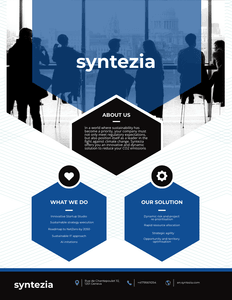
Syntezia CSRD
The Corporate Sustainability Reporting Directive (CSRD) requires large companies and/or listed companies to publish regular reports on the social and environmental risks they face, as well as on the consequences of their activities for the rights of people and the environment.
The aim is to enable investors, civil society organizations, consumers and other stakeholders to assess the degree of sustainability of these companies.
The CSRD Directive is part of the European Green Deal — a set of policy initiatives designed by the European Commission. The main objective is to enable the European Union to reduce its net greenhouse gas emissions by at least 55% by 2030, compared to 1990 levels, and to achieve climate neutrality. by 2050.
The CSRD amends the Non-Financial Reporting Directive (NFRD) by extending the scope of these disclosure requirements to a greater number of companies, as well as listed SMEs. The NFRD only applies to “public interest entities”, such as publicly traded companies, banks or insurance companies, employing more than 500 people. As a result, the number of companies required to report on non-financial matters increases from around 11,700 under the NFRD to around 50,000 under the CSRD.
Furthermore, the CSRD directive modernizes and strengthens the rules relating to social and environmental information that companies are required to communicate, since it specifies that this information must be relevant, comparable, reliable and accessible. Companies will have to report on their activities by following binding standards.
In contrast, under the NFRD, large companies were free to choose the standard for publishing their sustainability information and auditing was voluntary. The CSRD directive makes the latter mandatory.
Which organizations are affected by the CSRD directive?
It is the legal form of the public service media organization (PSM) that determines whether or not it falls within the scope of the CSRD.
Public service media organizations established under public law are not affected, unlike many PSM established under private law.
For example, an MSP incorporated as a joint stock company will be subject to it even if it is fully owned by the State.
The type of private legal entities that will be required to provide information varies between Member States. A list of relevant types of companies is provided in Annexes I and II of Directive 2013/34/EU on annual financial statements .
In accordance with the CSRD, among these companies, only those that meet one of the following criteria must publish sustainability information:
- all companies listed on the EU regulated market, including listed SMEs (but not micro-enterprises);
- all large companies exceeding two of the following three criteria:
- 250 employees during the financial year,
- an income statement of more than 20 million euros,
- a net turnover of more than 40 million euros;
- non-EU companies generating a net turnover of more than €150 million and which have a subsidiary in the EU meeting the criteria for EU companies or a branch in the EU generating a turnover of net business of more than 40 million euros.



